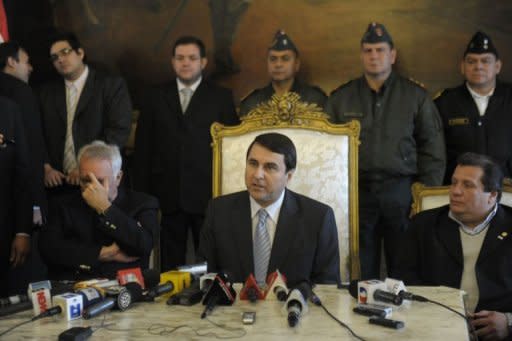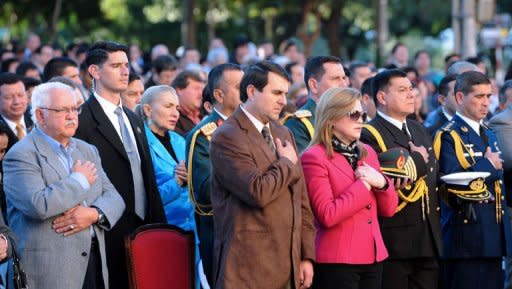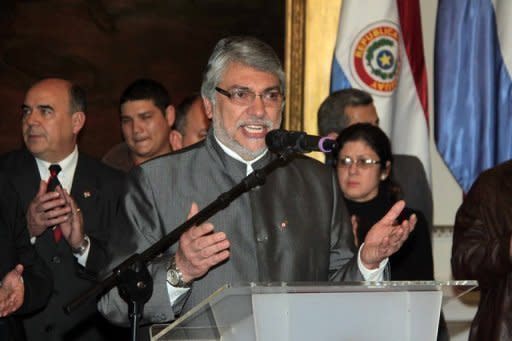New Paraguay leader faces mounting regional outcry
Paraguay's new president Federico Franco pledged to demonstrate "a clear commitment to democracy" Saturday amid a mounting international outcry over his predecessor's sudden ouster by a vote of Congress. "The current situation is a concern for me. I recognize that there are problems with the international community," Franco told reporters. "We will make our best efforts to get in touch with neighboring countries to try to demonstrate our clear commitment to democracy," he said. No foreign government has recognized Paraguay's new leadership so far, as the impoverished South American country hangs in a delicate balance amid a rare economic boom. The secretary general of the Organization of American States, Jose Miguel Insulza, called the snap impeachment Friday of President Fernando Lugo a "disrespect to due process." In a statement, Insulza said the Americas had once again witnessed "a summary judgement that, while formally in keeping with the law, did not appear to fulfill all the legal precepts of the right to a legitimate defense." Franco got his first chance to make his case in talks with the Vatican's envoy Agustin Arietti, and later in the day with the German and US ambassadors. "We reaffirm before the international community that we complied with constitutional law. We very much respect the presidents of our sister nations and will try to talk to them," Foreign Minister Felix Fernandez told 970 radio. Paraguayan lawmakers voted 39 to four to impeach Lugo Friday after a trial in which five lawyers acting on his behalf had just two hours to present their case in the Senate. He was accused of poor handling of an armed clash June 15 that claimed the lives of six police and 11 squatters on a privately-held farm. A torrent of furious responses poured in from across the region, not just from traditional leftist allies like Bolivia, Nicaragua and Venezuela, but also from centrist and right-wing governments in Argentina and Chile. President Cristina Kirchner took to her Twitter account to repeat that "Argentina will not validate the coup in Paraguay." Buenos Aires announced on Saturday that it was immediately withdrawing its ambassador to Paraguay, citing the "rupture in the democratic order." Bolivia, Ecuador and Venezuela said they would not recognize the new government, while the Inter-American Commission on Human Rights said the speedy transition of power had "affected the rule of law." "It's a travesty of justice and an affront to the rule of law to remove a president in 24 hours, with no guarantees to defend himself," IACHR executive secretary Santiago Canton said in a press conference. The first major international event the new government is expected to attend is a summit of South America's Mercosur trading bloc in Argentina on Thursday and Friday. But Franco said he had not yet received a "clear invitation" from Mercosur, in a hint to the bloc's other members. Peru said it had offered to host a presidential summit of Mercosur leaders next week to assess the situation in Paraguay. Franco, who served as Lugo's vice president, said his predecessor was ousted in accordance with constitutional law. Seeking to reassure his many critics, Franco insisted that "there was no coup." "There are no soldiers in the street," he added as calm reigned in the streets of the capital and across this small, impoverished and landlocked country. Franco noted that any blockade of Paraguay would hurt Brazilian entrepreneurs, who have major interests in the landlocked country. Sixty percent of Paraguay's trade is with Brazil. "Brazilian citizens living in the country, as always, will receive preferential treatment," he said, referring to the so-called brasiguayos, wealthy farmers who exploit the most fertile land in Paraguay. In Friday's vote, senators found Lugo, a 61-year-old former Catholic priest, guilty of performing his duties badly during a bloody land dispute. An hour later, to cheers inside Congress and angry clashes outside, Franco, 49, was sworn in as the new leader of one of Latin America's poorest nations. Farmers' leader Jose Rodriguez called on his followers to "remain mobilized" against what he considered a "parliamentary coup."





